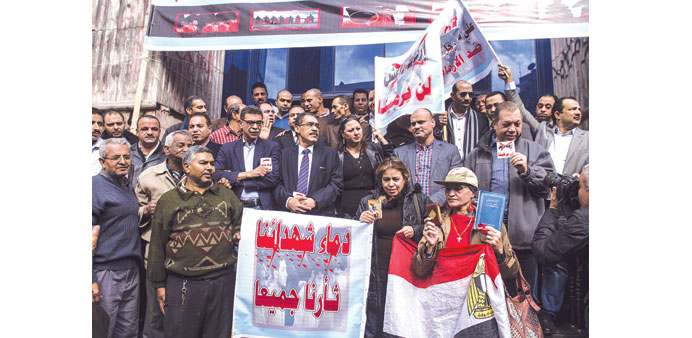Dozens of Egyptian journalists take part in a demonstration outside their syndicate in Cairo against the beheading of 21 Egyptian Coptic Christians by Islamic State militants on a beach in Libya.
AFP
Cairo
Egypt yesterday pushed for action against jihadists in Libya ahead of a UN Security Council meeting but faced reluctance from Western powers who stressed the need for a political solution.
After launching air strikes against Islamic State group targets in Libya this week in response to the jihadists’ beheadings of Egyptian Christians, Cairo has asked the Security Council to provide a mandate for an international intervention.
Italy said time was “running out” to address the threat from IS on Europe’s doorstep, but Rome and other Western powers said peace talks needed to be given another chance.
With the Security Council due to meet later in New York, Egyptian Foreign Minister Sameh Shoukry warned of the risks of inaction.
In talks with UN envoys, Shoukry stressed “the need for the international community... to assume its responsibilities towards the deteriorating situation in Libya, as it represents a clear threat to international peace and security,” his ministry said in a statement.
A US-led coalition is already carrying out air strikes against IS targets in Syria and Iraq, and Egyptian officials have suggested that effort should be expanded to Libya.
But Western powers have been wary of committing to action in Libya, where a Nato air campaign backed the 2011 uprising that ousted and killed dictator Muammar Gaddafi.
In a statement released by Rome, the US, Britain, France, Germany, Italy and Spain have stressed “the urgent need for a political solution to the conflict” in Libya.
An ongoing UN-backed attempt to get Libya’s warring sides to negotiate on forming a government of national unity was the “best hope” for peace, they said.
Shoukry suggested another option for the Security Council, calling for the lifting of an arms embargo that Libya’s internationally recognised government says has hobbled its efforts to tackle Islamist-linked militias who have seized parts of the country.
The Council must “reconsider the restrictions” on arms deliveries to the Libyan government which is seeking to “impose its authority and restore stability,” the ministry statement said.
The UN arms embargo was put in place at the start of the anti-Gaddafi uprising and has remained in place.
Libya has descended into chaos since the revolt, with the government forced to flee to the country’s east and militias in control of Tripoli and other main cities.
Some of Libya’s militias have pledged allegiance to IS - the brutal Sunni Muslim extremist group in control of large parts of Syria and Iraq - and one this week released a video of the gruesome mass beheadings of 21 Coptic Christians.
The country’s main militia groups, including the Islamist-backed Fajr Libya coalition that has declared a rival government in Tripoli and has been involved in the peace talks, have not linked up with IS.
But Italian Foreign Minister Paolo Gentiloni yesterday warned of the threat of such an alliance.
“There is an evident risk of an alliance being forged between local groups and Daesh and it is a situation that has to be monitored with maximum attention,” Gentiloni told lawmakers, using an Arabic acronym for IS.
Egyptian President Abdel Fattah al-Sisi has said “there is no choice” but to form an international coalition to tackle the militants by force in Libya.
Experts say Egypt’s Sisi wants to be seen as a key ally of the West against Islamist extremism, deflecting international criticism of his crackdown on the Muslim Brotherhood of former president Mohamed Mursi, whom he ousted in 2013.
As well as Libya to the west, Egypt is dealing with an insurgency in its own east, in the Sinai Peninsula, where jihadists have also joined IS and killed scores of troops.
Sisi checks border security
President Abdel Fattah al-Sisi yesterday warned Egypt would strike back at any militant threats to its security as he toured the border area with Libya, two days after Cairo bombed Islamic State targets there.
Accompanied by Defence Minister Sedki Sobhi, Sisi toured an air base near the borders with Libya to oversee measures aimed at securing his country’s western frontier.
Egypt directly intervened for the first time in the conflict in neighbouring Libya on Monday after Islamic State released a video showing the beheading of 21 Egyptian Christians.
“He (Sisi) stressed that Egypt will continue to confront firmly any attempts aimed at compromising its national security,” army spokesman Brigadier General Mohamed Samir said posted on his official Facebook page.
The decapitations pushed Sisi into open action, expanding his battle against Islamist militancy in Libya not long after he appeared to be gaining the upper hand against militants in the Sinai Peninsula.

